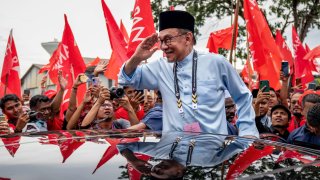
- Political experts predict more drama at Malaysia's upcoming general election with no certainty of a clear winner, a potential return of long-time ruling party Barisan Nasional and a possible hung parliament.
- Malaysia's political crisis has paved the way for a smorgasbord of parties and coalitions contesting the general election on Nov. 19.
- Over 21 million Malaysians are eligible to vote — up from 18 million in 2018 after the Malaysian parliament approved a bill to reduce the voting age to 18 years from 21.

The historic win by Malaysia's largest opposition party in 2018 is fading fast.
Political experts are predicting more drama at the country's upcoming general election on Saturday, with no certainty of a clear winner, a potential return of long-time ruling party Barisan Nasional and a possible hung parliament.
Four years ago, opposition coalition Pakatan Harapan swept Barisan Nasional — the ruling coalition at that time — out of power for the first time in 60 years.
Barisan's loss came after then Prime Minister Najib Razak failed to secure a reelection amid allegations of his involvement in the embezzlement of billions of dollars from Malaysian sovereign wealth fund 1MDB. He has since been sentenced to 12 years in prison.
But Pakatan's win quickly fizzled out amid infighting and the defection of coalition members.
Money Report
Then chairman and second-time prime minister Mahathir Mohamad resigned after 22 months in office and the coalition fell apart. The Southeast Asian nation has since had three prime ministers.
Malaysia's political crisis has paved the way for a smorgasbord of parties and coalitions contesting the general election on Nov. 19.
Get a weekly recap of the latest San Francisco Bay Area housing news. Sign up for NBC Bay Area’s Housing Deconstructed newsletter.
One of them is Pakatan Harapan, which is looking to secure a more stable win this time around while its new leader Anwar Ibrahim is looking to become prime minister after being denied the leadership for over two decades.
A record 945 candidates are running for the 222 parliamentary seats at the country's 15th general elections on Saturday.
Whether that is a good thing is uncertain, although it underscores the democracy of this year's election, according to ISEAS-Yusof Ishak Institute senior fellow Norshahril Saat.
"[Voters] now have many choices to choose from. What this means for stability, I am not sure, but [it's] definitely democratic," Norshahril said.
What to expect ahead of polling day
In early October, Malaysia's Prime Minister Ismail Sabri Yaakob dissolved the parliament to set up an early election amid alleged reports of more political infighting and desire by political incumbents to hold an election before a potential recession next year.
A federal election is held every five years and the next one was originally due next year. Campaigning began on Nov. 5.
The party or coalition which wins 112 seats – a simple majority – will form the government.
Over 21 million Malaysians are eligible to vote — up from 18 million in 2018 after the Malaysian parliament approved a bill to reduce the voting age to 18 years from 21.
Which parties to watch for
1. Pakatan Harapan is the largest opposition coalition and fielded the highest number of candidates at 206.
Aside from Pakatan Harapan, the incumbent Barisan Nasional will be in the draw to be reelected.
2. Barisan Nasional, the country's longest ruling coalition, includes the coalition's founding member and the nation's oldest political party, United Malays National Organisation (UMNO).
Prime minister Yaakob, a member of UMNO, is one of Barisan Nasional's 178 candidates contesting the election.
3. The other coalition to watch is Perikatan Nasional which has fielded 149 candidates.
Perikatan gained notoriety after it was formed in 2020 following the defection of members from Pakatan Harapan. The party coup has since been coined the "Sheraton Move," named after the meeting of defected members at the Sheraton Hotel.
Perikatan had intended to replace Pakatan.
Two of those responsible for the coup, Mohamed Azmin Ali, currently the minister of international trade and industry and Muhyiddin Yassin, who succeeded Mahathir after the defection, are key members of Perikatan.
4. Senior statesman Mahathir is running his own coalition of four parties, Gerakan Tanah Air which will be contesting 125 seats.
Key states to look out for
According to Mustafa Izzuddin, senior international affairs analyst with Solaris Strategies Singapore, there are some hot electoral federal seats to watch out. They include Tambun in Perak, which is being contested by Anwar, and Gombak in Selangor, which is being defended by Azmin.
"It could be Anwar's political swansong if he is defeated and a referendum of his leader-of-the-opposition status and his chances of becoming prime minister of Malaysia," Mustafa said.
"If Azmin is defeated, it will be a testament to the Sheraton perpetrators being punished by the Malaysian electorate for bringing down the Pakatan Harapan government."
As with past elections, all eyes would be on which party gets the largest share of the Malay vote followed by the Chinese votes and in some seats, the Indian votes as well, Mustafa said.
There could also be some developments in the eastern state of Sabah where there are "shifting political alignments" among parties and coalitions, Mustafa added.
"Watchful eyes are on the electoral outcome in Sabah as East Malaysia will likely play a pivotal role on who forms the Federal government in Malaysia," Mustafa said.
Given the large number of parties and candidates, a hung parliament is also a likelihood, Mustafa added.
"This would result in political horse-trading, brinkmanship and complex bargaining among the coalitions, including who becomes the next prime minister of Malaysia," he said.
What it could mean for investors
History could repeat itself, with the risk of another coalition collapse — especially if the resulting coalition is fragile, Mustafa said.
"In other words, a second Sheraton move cannot be ruled out if there is no clear majority win for any of the main coalitions."
That said, parties and coalitions should be able to cobble together a ruling coalition within two weeks or so, fragile or otherwise, associate director at consultancy Control Risks Harrison Cheng said.
"The [Malaysian] king would also be aware that a protracted period where there is no functioning government could significantly affect Malaysia's reputation among investors," he said.
The king, known in Malay as the Yang di-Pertuan Agong, played a key role in reinstating balance during the political crisis between 2018 and 2020.
Without an effective government, uncertainty could trickle down to the business community, Cheng added.
"This would impact policy-making and passage of regulatory reforms meant to ease business conditions. Investors may experience delays in their approvals for new projects," he said.
What's the sentiment among Malaysian voters?
The public's sentiment has been mixed, mainly due to electoral fatigue and disillusionment with the politics of the country, according to Mustafa.
"At the same time, there are those who are patriotic and want their vote to express their choice on who represents them in their constituencies and which coalition should run the country," he said.
With youths between 18 and 21 years now in the electoral mix — making up one fifth of voters — the group could be a "kingmaker" in this election, Mustafa said.
Like the the Philippines' Ferdinand "Bongbong" Marcos Jr's presidential win in May through what some have called the weaponization of social media, the internet could hold out to be an election battleground for Malaysia.
However, there were no signs to suggest that any single party or coalition has been able to capture the youth vote in a decisive manner, Cheng pointed out.
"For the more skeptical segments of the electorate, this election is the case of choosing the lesser of the two evil coalitions or the best of the worst coalitions on offer for Malaysians," Mustafa said.






